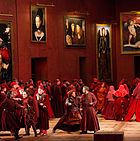Opera line-ups at the Salzburg Festival 1945 to 1947
The opera line-ups for the Salzburg Festival from 1945 to 1947 include all opera performances at the Salzburg Festival in those years. These years were shaped in particular by the conductors Josef Krips , Felix Prohaska and Hans Swarowsky , but they also brought the return of Otto Klemperer and the debut of Ferenc Fricsay .
Selected singing ensembles ensured the festival's immediate return to the world's top opera art.
concept
When the Vienna State Opera and St. Stephen's Cathedral on April 11, 1945 were destroyed in bombing raids on March 12, 1945, the Austrians were deeply affected. Suddenly it became clear to the people in the country that enthusiasm for the union, cheers from the leaders and the frenzy of war had caused nothing but destruction, destruction of the community, infrastructure and culture, and destruction of reputation and morality. The Austrians froze and starved. In his famous Christmas address from 1945, Leopold Figl pleaded with the citizens of his country to “believe in this Austria”. But he also told them clearly that he, the Chancellor, could not promise food, wood or glass to cut into. In this panorama of hopelessness, Mozart, the Vienna Mozart Ensemble and the Salzburg Festival were the last straws to cling to for many people. In the unheated alternative quarter of the State Opera, the Theater an der Wien , the Viennese sat in their coats, with long johns and gloves and listened to Così fan tutte , the magic flute and Fidelio .
Traveling within Austria was difficult, but possible due to the different occupation zones. Leaving the country or entering Austria was almost impossible in the immediate post-war period. These external circumstances favored the development and continuity of the Mozart Ensemble, whose artists demonstrated a high degree of perfection in Vienna and Salzburg and were also acclaimed on guest tours throughout Europe from 1947 onwards.
After the fall of the Nazi regime, the State Opera and the Salzburg Festival had to do their best to find people who were unencumbered or less burdened for management positions. The emigrants could not be brought back so quickly. The hour of the decent has struck. Josef Krips was the man of the hour, guarantor of a new beginning. It saved the Vienna Philharmonic's New Year's Concert into the new democratic era, and it enabled a carefree new beginning in Vienna and Salzburg. He was supported by Felix Prohaska and Hans Swarowsky , the returnees Otto Klemperer , who unfortunately was not mistaken for Salzburg, and the young Ferenc Fricsay .
1945
| Orchestra, choir, conductor | Director, equipment | singers | Singer | |||||
|---|---|---|---|---|---|---|---|---|
| The Abduction from the Seraglio by Johann Gottlieb Stephanie the Elder J. (based on Christoph F. Bretzner) and Wolfgang Amadeus Mozart , Salzburger Landestheater, August 15 to September 1, 1945 (six performances) | ||||||||
|
Mozarteum Orchestra Wiener Staatsopernchor Wolfgang Rennert Choir master by Felix Prohaska |
Herbert Waniek staging Wilhelm Reinking stage |
Maria Cebotari Konstanze Rosl Schwaiger Blonde |
Albin Skoda Bassa Selim Julius Patzak Belmonte Ludwig Weber Osmin Walter Carnuth Pedrillo Carlheinz Hundius Klaas |
|||||
1946
Change of line-up in subsequent performances:
- The Rosenkavalier . Faninal: Karl Schmidt , Valzacchi: Hermann Gallos
1947
Change of line-up in subsequent performances:
- Danton's death . Georg Danton: Mathieu Ahlersmeyer , Camille Desmoulins: Horst Taubmann , Simon: Karl Dönch
See also
source
- Josef Kaut : The Salzburg Festival 1920-1981, With a list of the works listed and the artists of the theater and music by Hans Jaklitsch . Residenz Verlag, Salzburg 1982, ISBN 3-7017-0308-6 , pp. 250-2 ...
Individual evidence
- ^ ORF (Lower Austria): Figl's mysterious Christmas speech , December 24, 2015
- ↑ Leopold Figl: Christmas address, subsequent recording of the address from 1945
- ↑ In this paragraph there is no contradiction in terms: individual travel across national borders was almost impossible until the early 1950s. The guest performances of the Vienna State Opera, on the other hand, were approved, supported and made possible by the federal government and the occupying powers.



